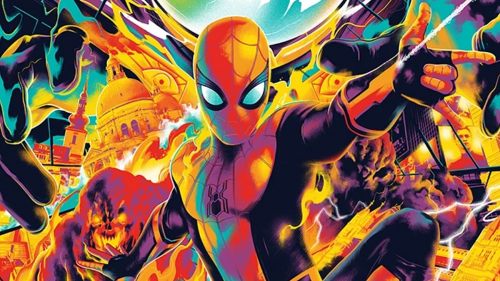MARVEL’S SPIDER-MAN Game Review: Great Power, Great Responsibility, Great Game
The very first thing you do in Marvel’s Spider-Man is swing through Manhattan. It's something you’ll do constantly, and miraculously, it never gets old. The fantasy of being Spider-Man has a lot to do with the character's nimble, high-wire acrobatics, and developer Insomniac Games absolutely nails that fantasy, pulling off clever tricks of code and animation to keep Peter Parker’s movement fluid and responsive. Details like whistling wind, the Doppler effect on the city below, scattering flocks of pigeons, and subtle time-ramping all add up to an exhilarating experience. Spider-Man goes where you want him to, and does it with delightful style.
And that’s just in getting from point A to point B.
“Delightful style” can be used to describe nearly everything about Insomniac’s masterpiece. Taking after a range of influences, most visibly melding the Arkham open-world game model with the sunny kineticism of Sam Raimi’s Spider-Man trilogy, it’s not just the best open-world game of the year; it’s probably the best superhero game ever made.
The polish begins with the storytelling. There's no origin story here; our guy is a well-known neighbourhood superhero - and a lesser-known struggling young scientist. Classic Spidey characters are subtly reinvented - J. Jonah Jameson as an Alex Jones type, mob boss Wilson Fisk as a Trump-alike, Otto Octavius as a Walter White-like tragic figure - while the story absolutely centres on Parker, investigative reporter Mary Jane Watson, and burgeoning neighbourhood hero Miles Morales. Backed by a score that evokes Danny Elfman just as Arkham's evoked Hans Zimmer, and written, directed, performed, and mo-capped to perfection, Marvel’s Spider-Man is the best screen Spidey story since 2004.
But it’s also a game, and Insomniac has done wonderful things in its design. Its critical-path missions are varied and interesting, including multiple playable characters (!) and a strong sense of pace that balances thrilling action setpieces with character-driven relationship building. Breaking up the story, the diverse open-world side activities smartly parceled out as the story progresses, so you’re never overwhelmed by map icons. The combat design is akin to other superhero brawlers, with a greater emphasis on webbing than fisticuffs; combined with the always-in-play traversal mechanics, it makes for truly fun and spectacular action.

Few ideas in Spider-Man are particularly new. Insomniac simply executes its open-world ideas better than anyone else, and that’s in large part thanks to linking everything to character. Barely a mission goes by without checking in on Peter’s loved ones. The weather and time of day shift only when it serves narrative and emotional purpose. The main villain’s storyline is intrinsically linked to Peter’s, a great story leading to a genuinely emotional climax. Even the fucking collectibles have meaning, like the dozens of backpacks scattered around Manhattan full of reminders of the past, or a cavalcade of Marvel Easter egg photo ops. One side mission has you literally tracking down a character’s lost pigeons - that most hackneyed of quest structures - but then follows up each pigeon with a heartfelt phone call about why it meant something to that character. Good writing makes everything better, and holy shit is the writing in Spider-Man terrific.
Among the relationships explored in Spider-Man is Peter Parker’s relationship to New York City, both as a superhero and as a young man. Much of Peter’s time is spent helping people, doing science, or talking to his friends; you can spend hours fighting smog, repairing sewage lines, or taking cheerful selfies with pedestrians. Insomniac’s detailed and expansive recreation of New York (New York! None of this "Liberty City" or "Gotham" nonsense) is bright and aspirational, representing the best aspects of the city without a hint of cynicism. It’s a New York where your friendly neighbourhood Spider-Man can chill out on the subway, and where even Twitter is still mostly made up of jokes. It’s Marvel’s New York, and it's a joy to spend time in.
The police are part of that aspirational approach - they pretty much unambiguously serve and protect. Much criticism has revolved around the game’s depiction of the notoriously problematic NYPD as a positive force with whom Spidey happily collaborates. Certainly, a more realistic interpretation would feature racial profiling or corruption or police brutality. Despite Peter Parker helping to prevent crime through volunteering at the FEAST homeless shelter, Spider-Man really really loves busting up drug deals and dealers. But such criticisms would seem to stem entirely from the first act of the game.
Once the plot gets going, it quickly becomes clear that Marvel’s Spider-Man is a story about how New York City responds to terrorism. A major bombing takes place early on, and mayor Norman Osborn’s immediate response is to ramp up the city's security. As the story progresses, New York itself changes, with increased surveillance and private security contractors brought in to ostensibly protect the people. Inevitably, that private security force becomes so empowered, and civil liberties so stripped away, that the city becomes an occupied zone, with ID checks at every major intersection, and with protesters rounded up into enhanced-interrogation prison camps. This is a story about New York responding to terrorism by radically militarising law enforcement - and about how Spider-Man, with a genuine love of his fellow New Yorkers, can do it better.

That all sounds very bleak, and Spider-Man definitely has its share of dark moments. But the developers have achieved a remarkable control of tone, modulating it primarily towards the bright, fun end of the spectrum - the lightness making the dark moments all the more powerful, and vice versa. Pleasing Spidey fans, it’s full of jokes, ranging from witty to groan-worthy; one setpiece sees Spider-Man and Electro trading Rocky quips as they fight. In many ways, it’s the optimistic opposite to the Arkham games. Where Batman is brute force, Spider-Man is all lithe sexuality and style; where Bruce Wayne's dead parents are a millstone, Peter Parker’s dead uncle is an inspiration. The only characters bent on vengeance here are the villains - and even they’re redeemable in Peter’s eyes.
Marvel’s Spider-Man represents some of the best-written, most highly-polished hours of gaming you can get your hands on right now. Every aspect screams production value - to the point where you wonder whether graphics really need to get any better than this - but it’s the love and heart and joy that sticks around. A sequel seems inevitable, given strong sales and reviews, and the game lays the groundwork for one that promises to be just as emotional. The sequel will also annoy racists, and that’s always a good thing. I look forward to it - and in the meantime, Marvel’s Spider-Man may end up being the first game in ages that I play to 100% completion.
It really is that damned good.



